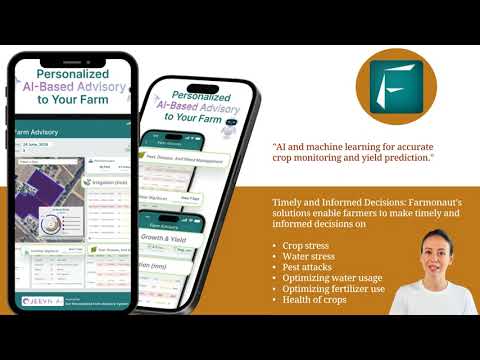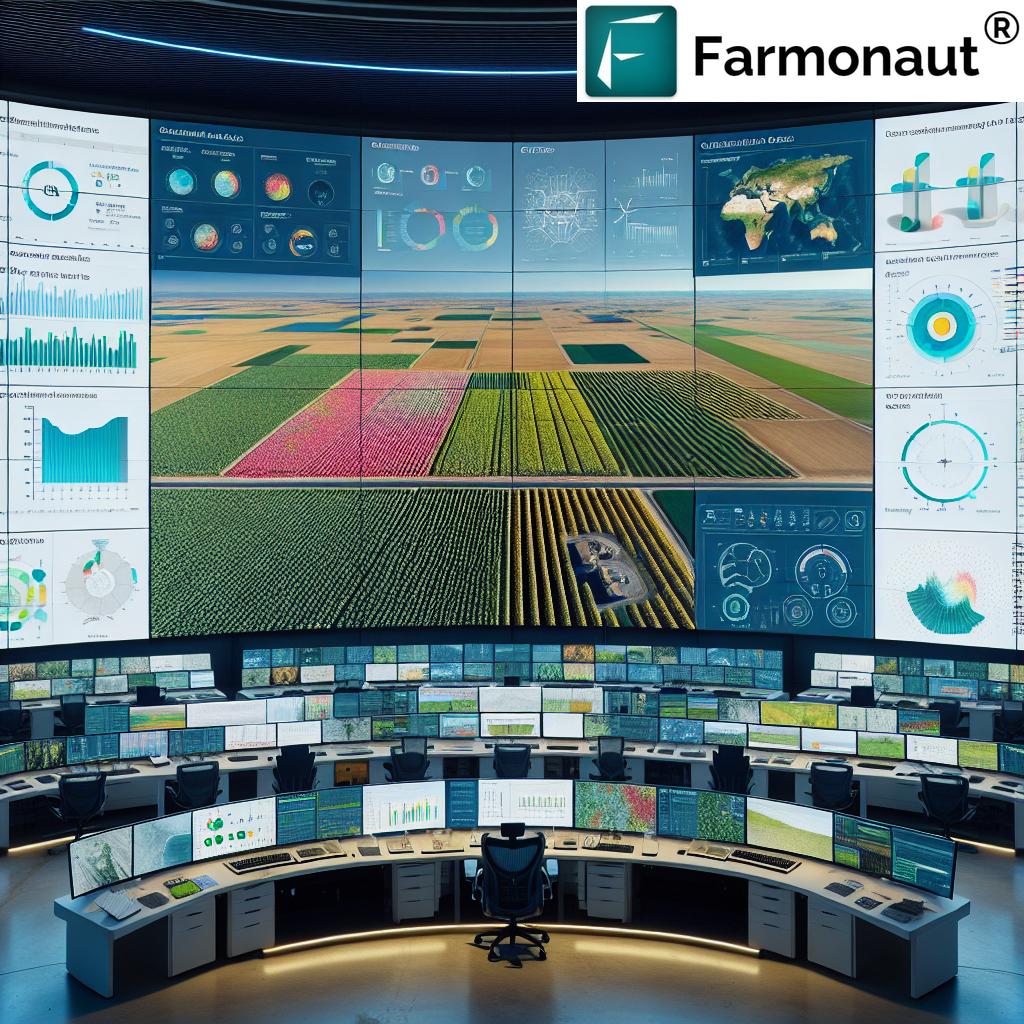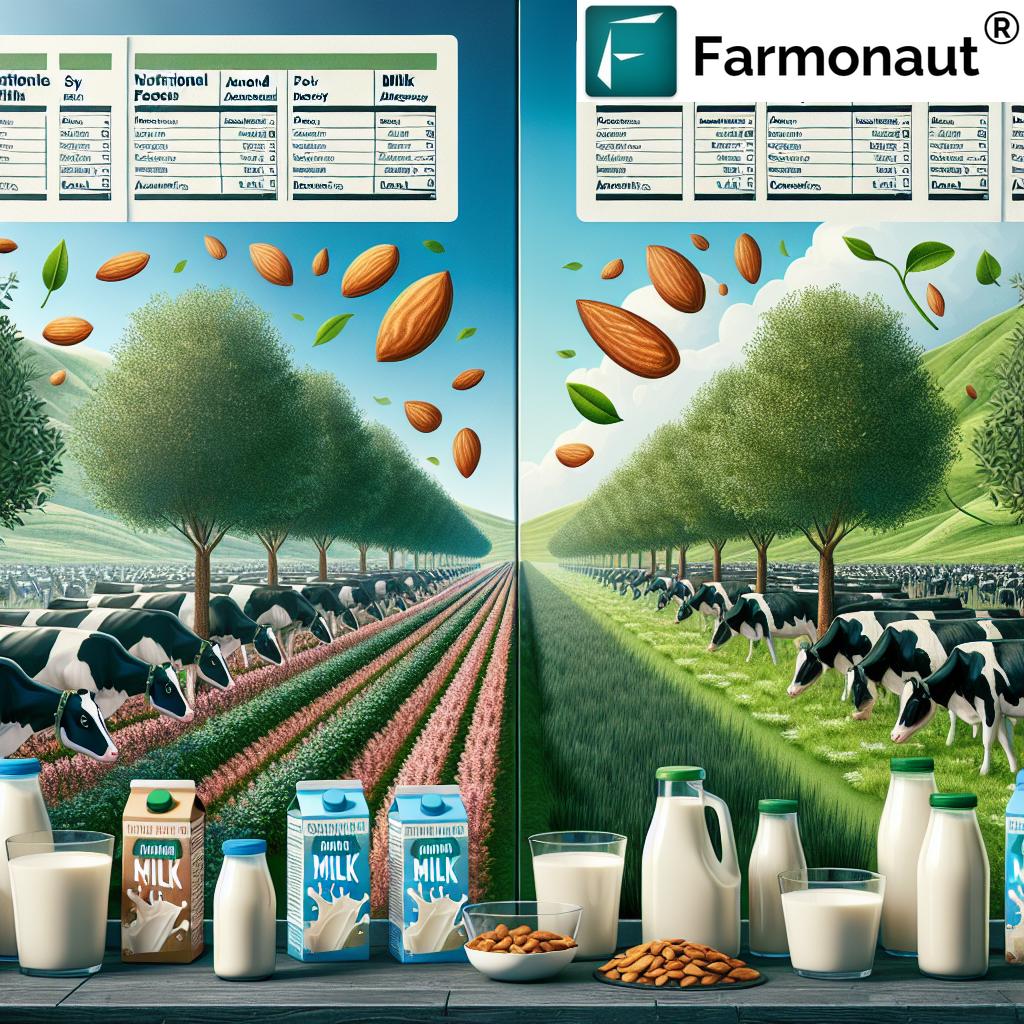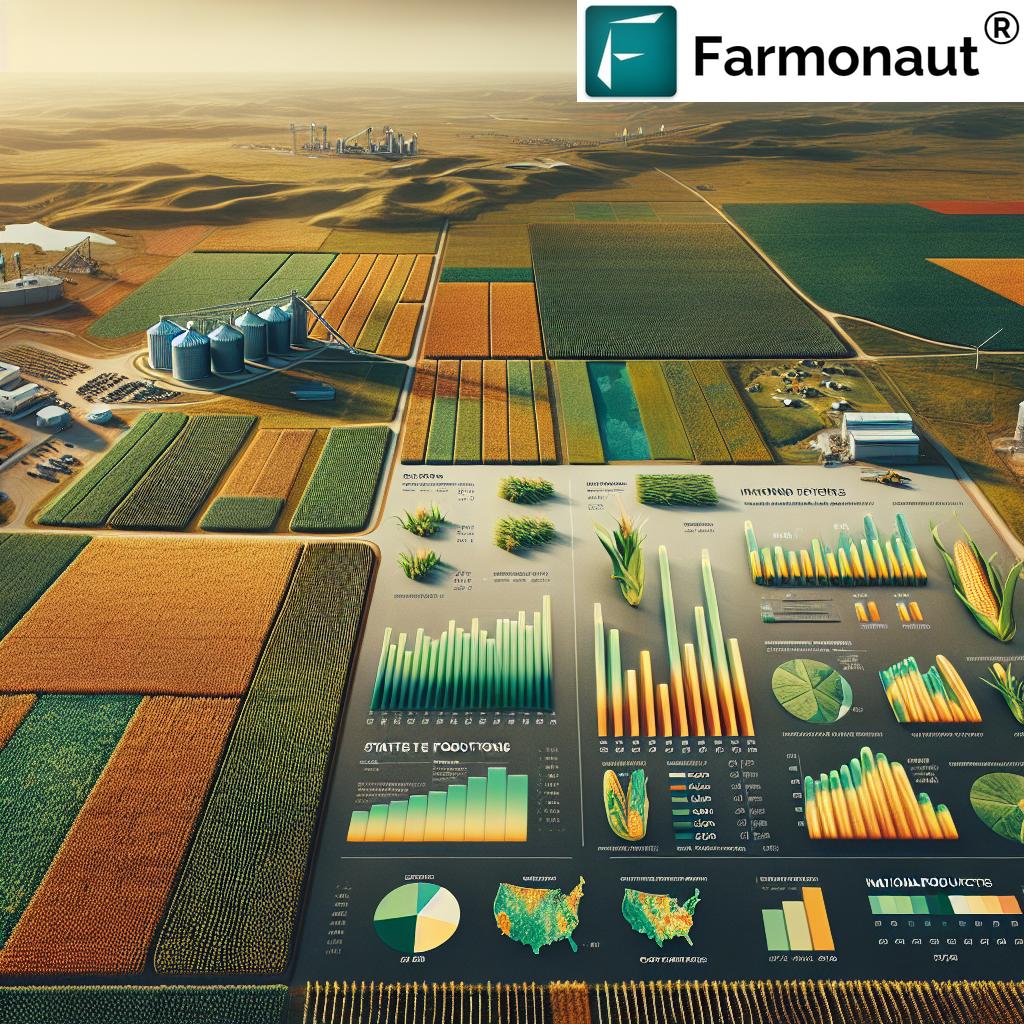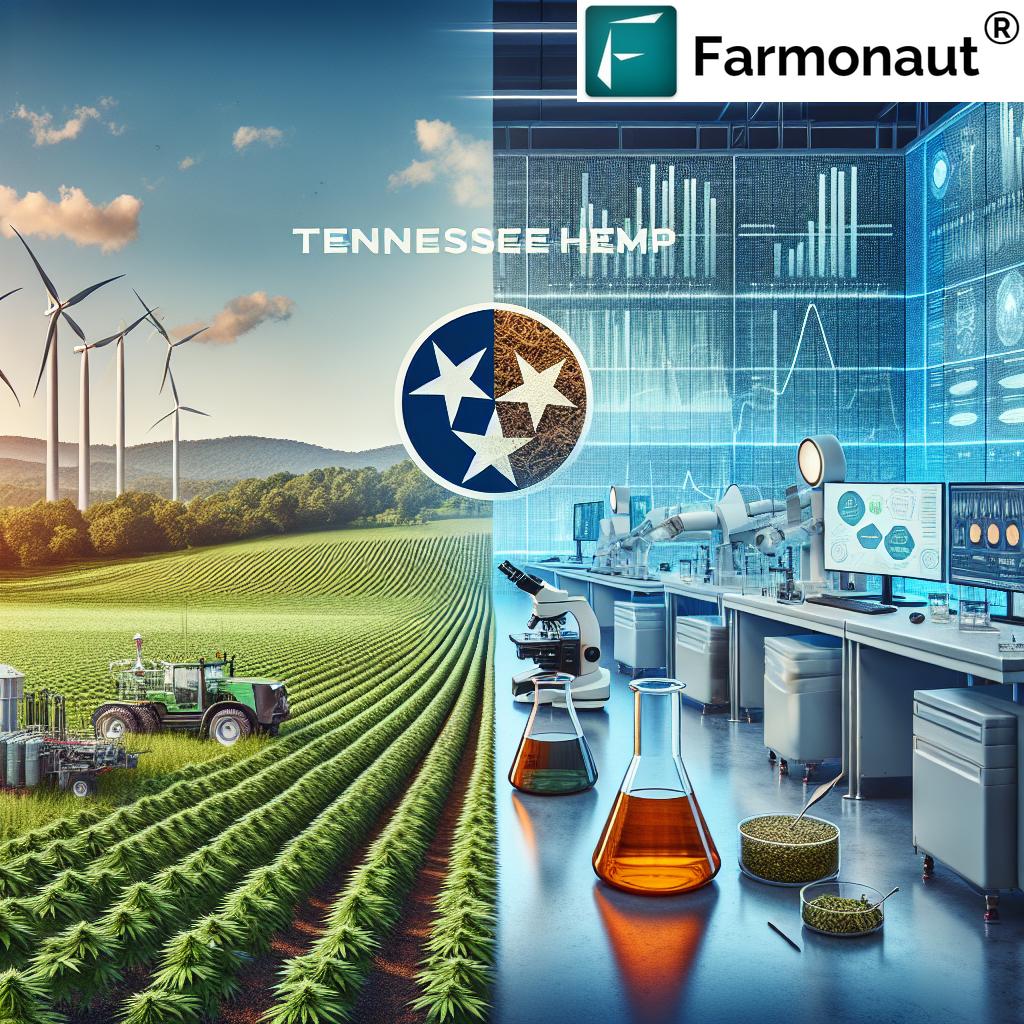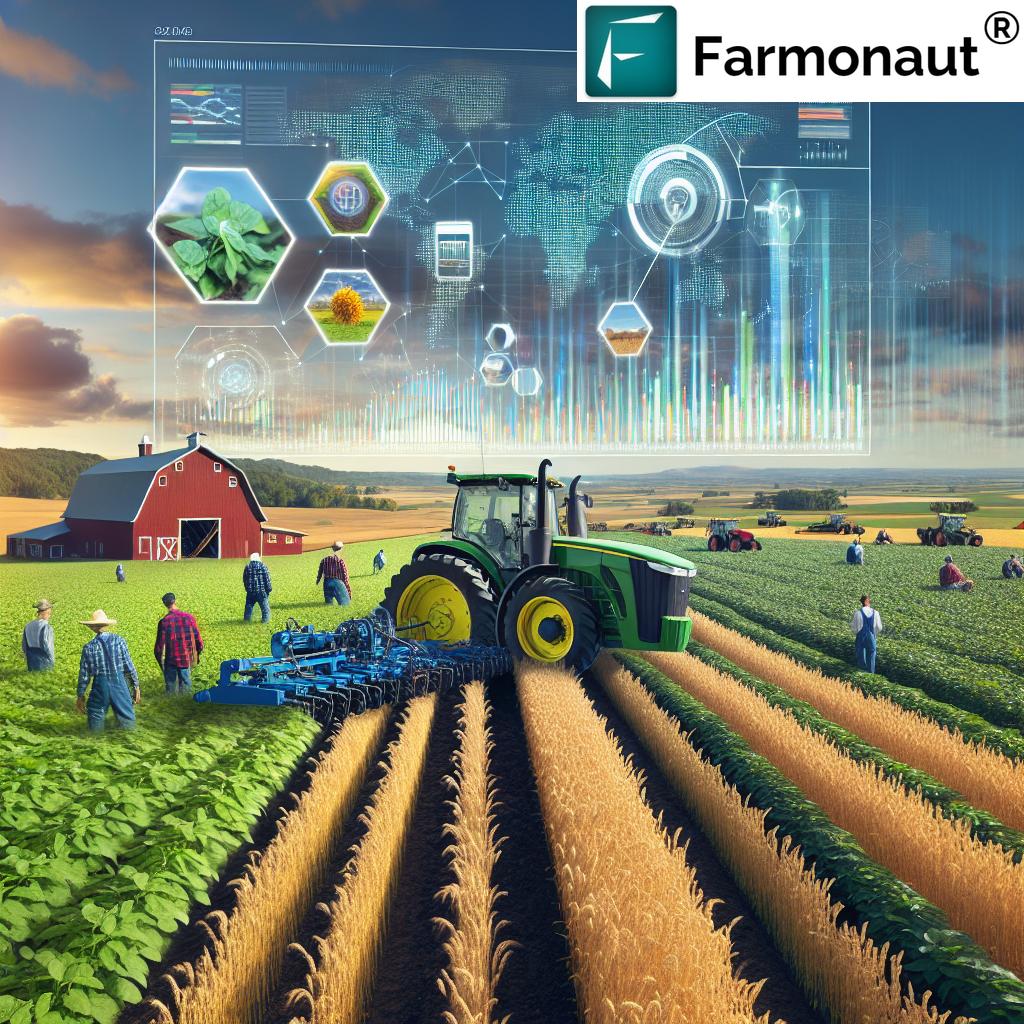Revolutionizing Western Farming: Precision Agriculture Technologies Boost Crop Yields in Wyoming, Nebraska, and Kansas
“Precision agriculture technologies have increased crop yields by up to 30% in Wyoming, Nebraska, and Kansas.”
In the vast heartland of America, where amber waves of grain stretch as far as the eye can see, a quiet revolution is taking place. The fertile fields of Wyoming, Nebraska, and Kansas are becoming testbeds for cutting-edge precision agriculture technologies that are transforming the way we farm. As we delve into this fascinating world of ag tech innovations, we’ll explore how these advancements are not only boosting crop yields but also reshaping the very fabric of western farming and ranching.
At Farmonaut, we’re at the forefront of this agricultural revolution, providing farmers with satellite-based farm management solutions that make precision agriculture both affordable and accessible. Our mission aligns perfectly with the innovative spirit sweeping across the Great Plains, where farmers are embracing digital agriculture solutions to overcome challenges and optimize their operations.
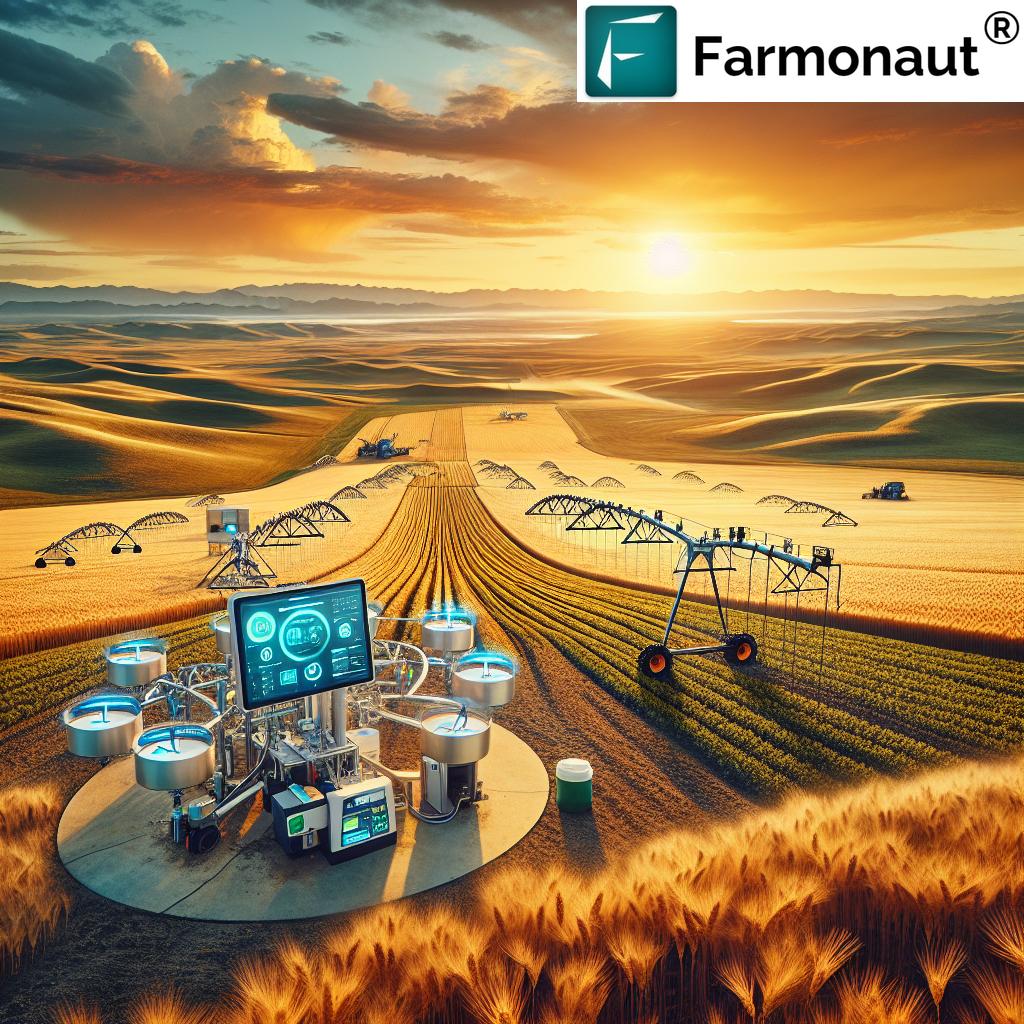
The Rise of Precision Agriculture in the Western States
The agricultural landscape in Wyoming, Nebraska, and Kansas has undergone a significant transformation in recent years. Traditional farming methods, while tried and true, are increasingly being supplemented or replaced by precision agriculture technology. This shift is not just a trend; it’s a necessity driven by the need to increase productivity, reduce costs, and adapt to changing climate conditions.
Let’s break down some of the key technologies that are making waves in these western states:
- Smart Irrigation Systems: In regions where water is a precious commodity, smart irrigation systems are revolutionizing water management. These systems use soil moisture sensors, weather data, and AI algorithms to determine precisely when and how much to water crops, reducing waste and improving yield.
- Agricultural Drone Mapping: Drones equipped with multispectral cameras are providing farmers with a bird’s-eye view of their fields. This technology allows for early detection of crop stress, pest infestations, and nutrient deficiencies, enabling targeted interventions.
- Soil Health Monitoring: Advanced sensors and IoT devices are giving farmers real-time data on soil conditions, including moisture levels, nutrient content, and pH balance. This information is crucial for making informed decisions about fertilization and crop rotation.
- Remote Sensing in Agriculture: Satellite imagery, like that provided by Farmonaut, is offering unprecedented insights into crop health and field conditions. This technology is particularly valuable in the vast expanses of the western states, where traditional scouting methods can be time-consuming and inefficient.
“Remote sensing in agriculture can detect plant stress up to 2 weeks before it’s visible to the human eye.”
Impact on Crop Yield Optimization
The adoption of precision agriculture technology has led to significant improvements in crop yield optimization across Wyoming, Nebraska, and Kansas. By providing farmers with detailed, actionable data, these technologies enable more precise decision-making throughout the growing season.
For instance, in the wheat fields of Kansas, farmers using precision ag tools have reported yield increases of up to 15% compared to traditional methods. In Nebraska’s corn belt, smart irrigation systems have not only boosted yields but also reduced water usage by up to 30%, a critical factor in an area prone to drought.
At Farmonaut, we’ve seen firsthand how our satellite-based crop health monitoring system has helped farmers in these regions optimize their yields. By providing regular NDVI (Normalized Difference Vegetation Index) updates, we enable farmers to spot potential issues early and take corrective action before crop health is significantly impacted.
Transforming Farm Management Practices
The integration of digital agriculture solutions is not just about increasing yields; it’s fundamentally changing how farms are managed. Farm management software has become an indispensable tool for modern farmers in the western states, allowing them to:
- Track and analyze crop performance over time
- Manage resources more efficiently
- Plan and execute precision planting and harvesting
- Monitor equipment performance and schedule maintenance
- Stay compliant with environmental regulations
Our Jeevn AI Advisory System at Farmonaut is playing a crucial role in this transformation. By providing personalized, AI-driven recommendations, we’re helping farmers make data-informed decisions that improve their bottom line while promoting sustainable farming practices.
Explore our comprehensive farm management solutions:
Sustainable Farming Practices Through Technology
As stewards of the land, farmers in Wyoming, Nebraska, and Kansas are increasingly focused on sustainable farming practices. Precision agriculture technology is proving to be a powerful ally in this endeavor. By enabling more efficient use of resources, these technologies are helping to reduce the environmental impact of farming while maintaining or even increasing productivity.
Some key sustainable farming practices enabled by precision ag include:
- Variable Rate Application: Using GPS and soil data to apply fertilizers and pesticides only where and when they’re needed, reducing chemical runoff.
- Conservation Tillage: Precision guidance systems allow for more accurate no-till or low-till farming, preserving soil health and reducing erosion.
- Water Conservation: Smart irrigation systems and soil moisture sensors help farmers use water more efficiently, a critical factor in drought-prone areas.
- Carbon Sequestration: By optimizing crop growth and soil health, precision agriculture can help increase the amount of carbon stored in the soil, contributing to climate change mitigation.
At Farmonaut, we’re committed to supporting these sustainable practices through our technology. Our carbon footprinting feature, for instance, helps agribusinesses monitor and reduce their environmental impact, aligning with the growing emphasis on sustainability in the agricultural sector.
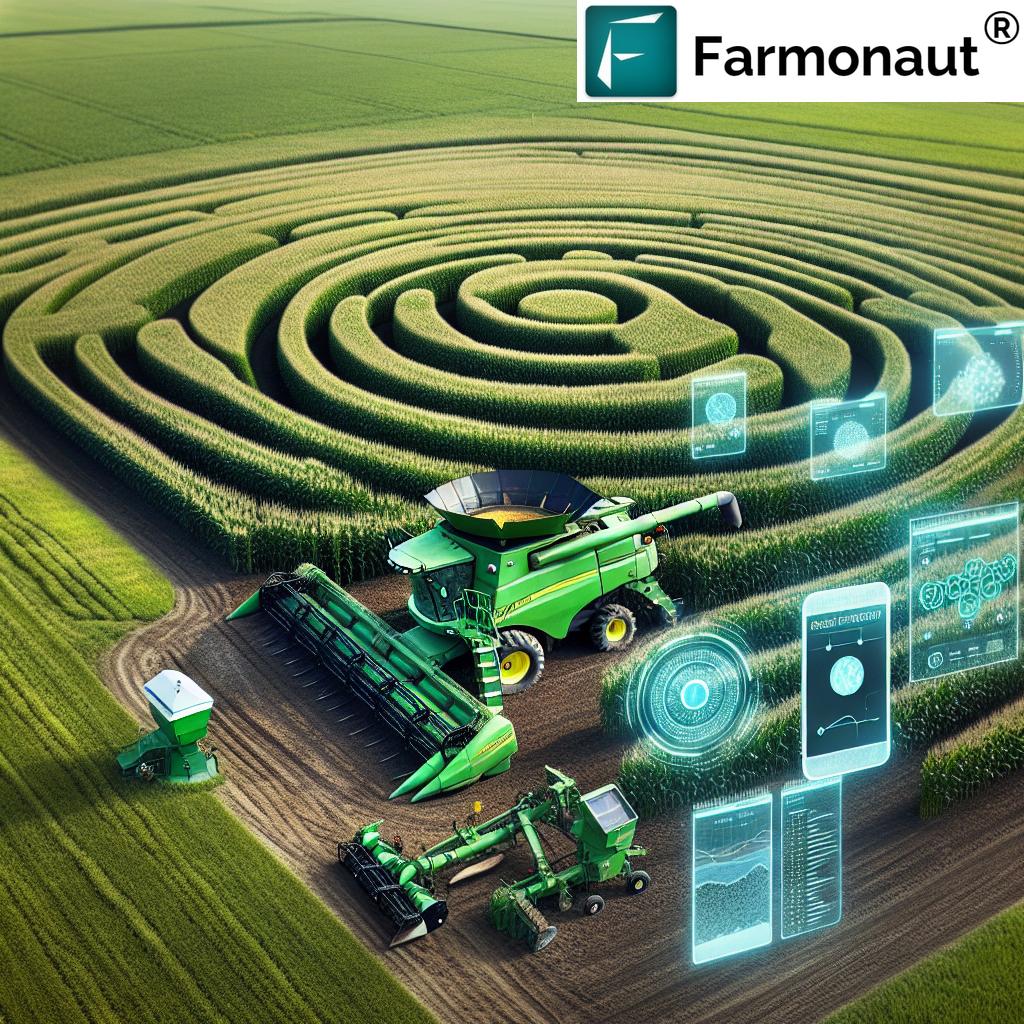
The Role of Agricultural Drone Mapping
Agricultural drone mapping has emerged as a game-changer for farmers in Wyoming, Nebraska, and Kansas. These unmanned aerial vehicles, equipped with advanced sensors and cameras, are providing farmers with unprecedented insights into their fields.
Key benefits of agricultural drone mapping include:
- Rapid field scouting, covering large areas in a fraction of the time it would take on foot
- Early detection of pest infestations, disease outbreaks, and nutrient deficiencies
- Creation of detailed 3D maps for drainage planning and irrigation system design
- Precise crop yield estimation, helping farmers make informed harvest and marketing decisions
While drones offer incredible capabilities, it’s important to note that they complement rather than replace satellite-based solutions like those offered by Farmonaut. Our satellite imagery provides a broader, more frequent view of crop health, which can be used in conjunction with drone data for comprehensive field analysis.
Smart Irrigation Systems: A Water-Wise Revolution
In the semi-arid regions of Wyoming, Nebraska, and Kansas, water management is a critical aspect of successful farming. Smart irrigation systems are at the forefront of water conservation efforts, helping farmers maximize crop yields while minimizing water usage.
These systems typically include:
- Soil moisture sensors that provide real-time data on water needs
- Weather stations that factor in local climate conditions
- AI-powered control systems that optimize watering schedules
- Remote monitoring and control capabilities via smartphone apps
The impact of smart irrigation has been significant. For example, in Nebraska, where irrigation is essential for corn production, farmers using these systems have reported water savings of up to 40% while maintaining or even increasing yields.
At Farmonaut, we complement these smart irrigation systems by providing satellite-based soil moisture data. This information helps farmers validate their ground-level sensor readings and make more informed irrigation decisions across large areas.
Soil Health Monitoring: The Foundation of Precision Agriculture
Healthy soil is the foundation of successful farming, and precision agriculture technologies are giving farmers in Wyoming, Nebraska, and Kansas unprecedented insights into their soil conditions. Advanced soil health monitoring tools are enabling farmers to:
- Track nutrient levels in real-time, allowing for precise fertilizer application
- Monitor soil pH and make timely adjustments to optimize crop growth
- Assess soil organic matter content to improve long-term soil health
- Detect soil compaction issues that could impede root growth
These insights are crucial for making informed decisions about crop selection, rotation planning, and overall farm management. By understanding the nuances of their soil health, farmers can tailor their practices to the specific needs of each field, or even different zones within a single field.
Farmonaut’s satellite-based monitoring complements these ground-level soil health tools by providing a broader perspective on field conditions. Our NDVI maps can highlight areas of stress or variability that might warrant closer investigation with soil testing.
The Power of Remote Sensing in Agriculture
Remote sensing technology, particularly satellite-based systems, is revolutionizing agriculture in Wyoming, Nebraska, and Kansas. This technology allows farmers to monitor vast areas of cropland efficiently, providing valuable insights throughout the growing season.
Key applications of remote sensing in these western states include:
- Crop health assessment using multispectral imagery
- Early detection of pest infestations and disease outbreaks
- Monitoring of crop development stages for optimal harvest timing
- Assessment of drought stress and irrigation effectiveness
- Yield prediction and estimation
At Farmonaut, we specialize in providing high-quality satellite imagery and analysis to farmers. Our platform delivers regular updates on crop health, allowing farmers to track changes over time and respond quickly to any issues that arise.
Impact on Grain and Forage Production
The adoption of precision agriculture technologies is having a significant impact on grain and forage production in Wyoming, Nebraska, and Kansas. These states are known for their production of wheat, corn, soybeans, and various forage crops, all of which are benefiting from advanced farming techniques.
Some notable impacts include:
- Increased wheat yields in Kansas through optimized fertilizer application and disease management
- Improved corn production in Nebraska with precision planting and smart irrigation systems
- Enhanced soybean yields in all three states through better pest management and soil health practices
- More efficient production of forage crops like alfalfa, benefiting both crop and livestock farmers
These improvements in production are not just boosting farm profitability; they’re also contributing to food security and economic stability in the region. As precision agriculture continues to evolve, we can expect to see even greater gains in productivity and sustainability.
Reshaping Traditional Farming and Ranching Methods
The integration of precision agriculture technologies is fundamentally reshaping traditional farming and ranching methods in Wyoming, Nebraska, and Kansas. While these states have a rich agricultural heritage, farmers and ranchers are increasingly embracing modern tools to address contemporary challenges.
Key changes in farming and ranching practices include:
- Shift from uniform field management to zone-based approaches
- Integration of data analytics in decision-making processes
- Adoption of precision livestock farming techniques
- Increased focus on soil health and regenerative agriculture practices
- Greater emphasis on sustainable resource management
At Farmonaut, we’re proud to be part of this transformation. Our technologies are helping farmers bridge the gap between traditional knowledge and modern data-driven approaches, ensuring that the rich agricultural legacy of these western states continues to thrive in the digital age.
Market Reports and Production Trends
The adoption of precision agriculture technologies is not only changing how farms operate but also influencing market dynamics and production trends in Wyoming, Nebraska, and Kansas. As we analyze recent market reports, several key trends emerge:
- Increased crop yields are impacting supply and pricing in grain markets
- More consistent quality of produce due to precision farming techniques
- Growing demand for sustainably produced crops, driven by consumer preferences
- Shift towards higher-value crops enabled by precise management practices
- Emergence of new markets for data-driven agricultural services
These trends underscore the importance of staying informed about technological advancements and market dynamics. At Farmonaut, we’re committed to providing farmers with the tools and insights they need to navigate these changing markets successfully.
The Future of Agriculture in Wyoming, Nebraska, and Kansas
As we look to the future, it’s clear that precision agriculture will play an increasingly vital role in shaping the agricultural landscape of Wyoming, Nebraska, and Kansas. We anticipate several key developments:
- Further integration of AI and machine learning in farm management
- Increased adoption of autonomous farming equipment
- Greater emphasis on data interoperability between different ag tech platforms
- Expansion of precision agriculture techniques to smaller farms
- Growing focus on climate-smart agriculture practices
At Farmonaut, we’re continuously innovating to meet the evolving needs of farmers in these regions. Our commitment to making precision agriculture accessible and affordable aligns perfectly with the future trajectory of farming in the western states.
Explore our API for custom agricultural solutions:
Farmonaut API
API Developer Docs
Precision Agriculture Technology Comparison
| Technology Name | Primary Function | Crop Yield Improvement (estimated %) | Implementation Cost Range (estimated $) | Adoption Rate in the Region (estimated %) |
|---|---|---|---|---|
| Smart Irrigation Systems | Water management optimization | 10-20% | $5,000 – $50,000 | 40-50% |
| Agricultural Drone Mapping | Field scouting and crop monitoring | 5-15% | $2,000 – $20,000 | 30-40% |
| Soil Health Monitoring Tools | Soil nutrient and moisture analysis | 8-18% | $1,000 – $10,000 | 50-60% |
| Remote Sensing Applications | Large-scale crop health assessment | 10-25% | $500 – $5,000 (annual subscription) | 60-70% |
Frequently Asked Questions
Q: How does precision agriculture benefit small farmers in Wyoming, Nebraska, and Kansas?
A: Precision agriculture technologies can benefit small farmers by increasing efficiency, reducing input costs, and improving crop yields. Many solutions, like Farmonaut’s satellite-based monitoring, are scalable and affordable for smaller operations.
Q: What are the main challenges in adopting precision agriculture technologies in these western states?
A: Common challenges include initial investment costs, the learning curve associated with new technologies, and ensuring reliable internet connectivity in rural areas. However, the long-term benefits often outweigh these initial hurdles.
Q: How does precision agriculture contribute to sustainable farming practices?
A: Precision agriculture promotes sustainability by optimizing resource use, reducing chemical inputs, conserving water, and improving soil health. This leads to more environmentally friendly farming practices while maintaining or increasing productivity.
Q: Can precision agriculture technologies help farmers adapt to climate change?
A: Yes, these technologies provide valuable data and tools that help farmers adapt to changing climate conditions. For example, smart irrigation systems and drought-resistant crop varieties can help manage water scarcity issues.
Q: How does Farmonaut’s technology integrate with other precision agriculture tools used in Wyoming, Nebraska, and Kansas?
A: Farmonaut’s satellite-based monitoring complements ground-level sensors and other precision ag tools. Our API allows for integration with various farm management software, creating a comprehensive precision agriculture ecosystem.
Conclusion
The agricultural revolution unfolding across Wyoming, Nebraska, and Kansas is a testament to the power of precision agriculture technologies. From smart irrigation systems to satellite-based crop monitoring, these innovations are transforming the way we farm, boosting yields, and promoting sustainability.
As we’ve explored in this comprehensive overview, the impact of these technologies extends far beyond individual farms. They’re reshaping market dynamics, influencing production trends, and paving the way for a more resilient and sustainable agricultural future in the western states.
At Farmonaut, we’re proud to be part of this exciting transformation. Our commitment to making precision agriculture accessible and affordable aligns perfectly with the needs of farmers in Wyoming, Nebraska, and Kansas. As we look to the future, we’re excited about the continued evolution of ag tech and its potential to further revolutionize farming in these vital agricultural regions.
Whether you’re a seasoned farmer looking to optimize your operations or an industry professional staying abreast of the latest trends, embracing precision agriculture is no longer just an option—it’s a necessity for staying competitive in today’s rapidly changing agricultural landscape.
Join us in cultivating a smarter, more sustainable future for agriculture. Explore Farmonaut’s solutions and see how we can help you harness the power of precision agriculture for your farm.






